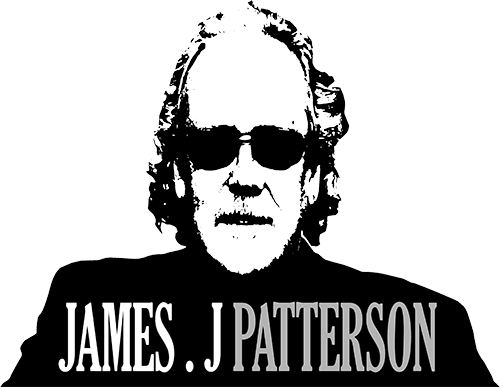On Writing Roughnecks
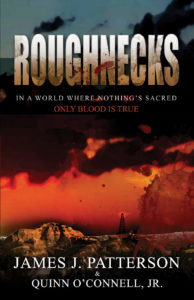 I grew up at a time when something called “The Great American Novel” was still revered, aspired to, attempted. Steinbeck, Melville, Fitzgerald, Hemmingway, Harper Lee, and poets like Whitman, Dickenson, Sandberg, and Frost had taken their art into the heart of America and told us something about ourselves. They certainly were following in the footsteps of certain European authors who took the broad view and dove deep, from macrocosm to microcosm and back again: Dickens, Balzac, the Brontes, and Dostoevsky, to name some of the heavy hitters, pointed the way. So, naturally, when my old grade-school chum, Quinn O’Connell, Jr, came to me with his Roughneck adventure in the oil fields of North Dakota and Montana, I thought, “Great American Novel” baby!
I grew up at a time when something called “The Great American Novel” was still revered, aspired to, attempted. Steinbeck, Melville, Fitzgerald, Hemmingway, Harper Lee, and poets like Whitman, Dickenson, Sandberg, and Frost had taken their art into the heart of America and told us something about ourselves. They certainly were following in the footsteps of certain European authors who took the broad view and dove deep, from macrocosm to microcosm and back again: Dickens, Balzac, the Brontes, and Dostoevsky, to name some of the heavy hitters, pointed the way. So, naturally, when my old grade-school chum, Quinn O’Connell, Jr, came to me with his Roughneck adventure in the oil fields of North Dakota and Montana, I thought, “Great American Novel” baby!
Roughnecks and Moby Dick
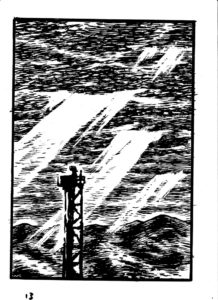
I read and re-read Moby Dick a half dozen times at least during the writing of Roughnecks. I had taken a full semester course on the book in college, way back when. (My favorite is the Modern Library edition featuring the marvelous illustrations by Rockwell Kent. For Roughnecks we used the British artist Jack Brougham, whose woodcut-like images captured truly the rough-hewn tone of the adventure) So Moby Dick was always at my elbow during the writing. At times when I was frustrated, I would open the book to a random page and give a dramatic reading out loud to the walls and windows of my work space. A rolling sea will sport waves of approximately the same height and power in all directions, much like, I observed, the static yet rolling landscape in our story of the oil patch, with hills of the same shape and size as far as the eye can see. So the driller on oil rig No. 34 of the Bomac Drilling Co. has moments such as this:
The Zachary Harper character in Roughnecks is modelled on Quinn, of course, but only partly. I leaned heavily on Ishmael from Moby Dick. Ishmael, whom playwright David Catlin has called “The original outcast – the unborn bastard son of Abraham…unconnected, unmoored and rudderless.”
The night that Zak and OK Wellman spend together on Bear Butte near the end of the book mirrors slightly a scene in the beginning of Moby Dick where Ishmael is obliged to share a bed with the pagan cannibal priest Queequeg, the harpooner, at the Spouter Inn. A soliloquy Wellman has about getting restless in civilized society takes a hint from a reverie Ishmael has also at the beginning of Moby Dick regarding his impatience toward city dwellers and civilization at large. There are many many other parallels, perhaps some even I am not aware of.
Roughnecks and Dostoevsky’s The Idiot
As Quinn and I were preparing a research mission to The Williston Basin, Quinn’s descriptions of the prairie, the harsh winter, the grueling dangerous work, all said Russian novel to me, so I grabbed a copy of Dostoevsky’s The Idiot before setting out. Why The Idiot? It was one I hadn’t read, and the only Russian novel the bookstore had in stock at the time. Plus, isn’t there something illogical (read idiotic) about chucking your life and dashing out into a world of unknown dangers? But on the long ride out from Washington, DC, to the Montana hell-and-gone I got the feeling that there was a link between Zak Harper and Prince Mishkin from Dostoevsky’s book. Mishkin has been away and he returns a changed man, quiet, reserved. His old friends project onto him definitions as to where he’s been and what he’s been up to, and what he has or hasn’t morphed into in the interim. Unknown to them, he was hiding out at a sanitorium, getting himself “sorted” as my British friends might say. The prince’s circumstance reminded me of another man who might just want to remain quiet about his origins, movements, and motivations.
Roughnecks and Jack Kerouac’s On the Road
Sal Paradise, the narrator of Kerouac’s On the Road is another model for Zak Harper, I always loved Kerouac’s affection for his characters – I think it’s what sets him apart – and I hope that affection is front and center in Roughnecks. For Kerouac, those miscreants, lost souls, and fellow wanderers are all “angels” of one type or another, and what Zak Harper lacks in familiarity and shared background with those he encounters on his adventure, he attempts to make up for with comity, empathy, and service. And it doesn’t go unnoticed or unappreciated. The character Simone, a muse-like love-interest of Zak’s, when comparing their previous lives, refers to some of the passionate characters from her own past as “beautiful idiots.” I like that. One of the joyful things about working with Quinn was his ability to self-mythologize, meaning that he saw the people around him as rather Homeric in the quiet courage and sacrifice they evinced in the total obscurity of their position and place. Read any journalism about the “oil patch” and you’ll hear about the danger, the death, the illiteracy, the loose morals, the poverty, and the boom times, but you’ll have a hard time finding a trace of humanity. Quinn’s cup overflows with it, and I hope I was able to catch that as well.
Roughnecks and Stranger in a Strange Land
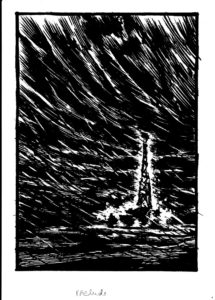
One of my favorite moments in Heinlein’s masterpiece was a scene at the beginning where the Stranger, an alien from another planet, wakes up on a table or gurney, and he doesn’t know what he’s lying on, doesn’t know what a window is. Every single thing he’s sees, things we take for granted, is utterly strange. Frank Herbert’s Dune shares that bewildering strangeness. Some might find an almost science fiction-like quality in tone at the beginning of Roughnecks. I felt that the opening scene should put the reader in this world and let he or she sort it out, as would happen to most of us in the same situation. The scene is full of strange jargon, incomprehensible objects, and danger. Although I hope the reader is aware that the events being realized in its “Prelude” are somehow of consequence, he or she has no way of knowing what those consequences are.
During an outrageous storm a man walks off the job; therefore a job has come open. In Chapter One, another man wakes up, sleeping under his jeep, and it has rained.
Other Influences
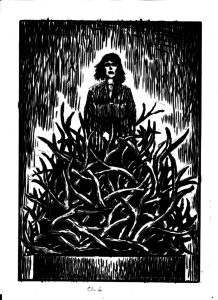
Finding a female presence in this story was a challenge until I realized that in Native American mysticism, especially deep in this part of the country, most nature deities are feminine, and once I dived into that aspect, a path opened for me. Certain women I encountered on my journeys stepped forward and their stories are in the book as well.
I read recently where most Americans have never seen the Milky Way. Can you imagine? In this part of the world it’s practically on top of you, so I added astronomy to the mix of atmosphere and tone. I came to consider the sun, the moon, and the stars to be important characters in the drama.
So Roughnecks takes a few dozen pages to get into, to get the lay of the land so to speak, but the rewards I think are plenty and gratifying. I hope you find the reading worth the effort. It was a hard book to let go of. It’s yours now. Take care of it for me.
-JJP 12/16
